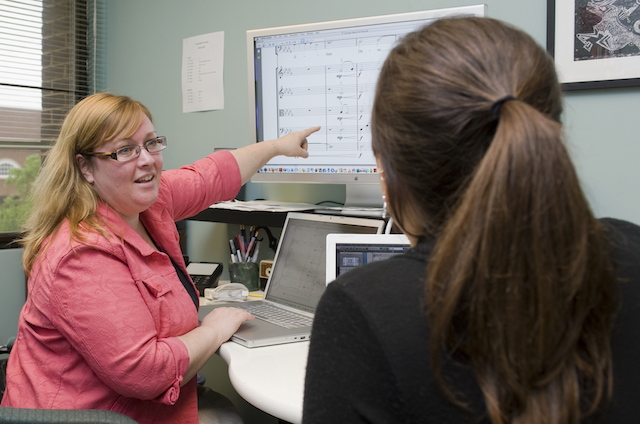
MAJOR FINDER
Filter by College
Filter by Subject
Music Theory

UNDERSTAND HARMONY, CACOPHONY AND EVERYTHING IN BETWEEN
Students completing a Bachelor of Music in Music Theory undergo a rigorous program that prepares them to continue on to graduate study in the field. In addition to working closely with the theory faculty, students receive mentoring and are encouraged to attend and present at regional and national conferences. Students also write an extended research paper on a related topic chosen in consultation with their adviser, in addition to completing studies in cognate fields such as foreign languages, music history and research methods.
Advanced courses in counterpoint, orchestration, analysis, keyboard harmony and analytical technique seminars exposes our students to a broad array of approaches to understanding, analyzing, hearing, performing and composing music. By offering numerous ways to deepen one’s engagement with music, theory courses provide a solid foundation for musical experiences at the University of Delaware and beyond.
Students in this major have been accepted to prestigious graduate programs in music theory such as those at the Ohio State University, McGill University and Hunter College.
RELATED MAJORS
AREAS OF STUDY
- Music Theory
- Aural Skills
- Music History
- Piano
- Private Weekly Instrumental or Vocal Lessons
- Ensembles
- Advanced Study in Music Analysis, Orchestration and Harmonic Forms
- Independent Research and Thesis Projects
- German Language
CAREER OPTIONS
- Collegiate-Level Teaching
- Academic Textbook Publishing
- Music and Arts Advocacy
- Vocational Composition and Arranging
- Academic and Non-Academic Writing
GRADUATE PROGRAMS
- Music Theory
- Music Business
- Music Education
- Music Therapy
What’s special about this program?
This major can be personalized to fit the academic and professional pursuits of each student, individualized to incorporate minors, Honors Degrees, Degrees with Distinction, service learning, study abroad and research. We maintain a low student-to-faculty ratio and small classes, providing access to a passionate, invested and highly accomplished faculty comprised of professionally active performers, composers, educators, theorists and musicologists. The study of music at Delaware is enriched by nearly 300 performances each year by faculty, students, ensembles and guest artists. Additionally, the vast musical resources of Philadelphia, Baltimore, Washington, D.C., and New York City are easily accessible to our majors.
Get Involved
Phi Mu Alpha Sinfonia (Xi Mu Chapter)
Sigma Alpha Iota (Eto Rho Chapter)
National Association for Music Education (NAfME)
American Choral Directors Association (ACDA)
The Society of Composers, Inc. (SCI)
American String Teachers Association (ASTA)
The Jazz Educators and Performers Association (JEPA)
Music Management Student Assoc (MMSA)
College Music Society (UD Student Chapter)
Music Theory Society of the Mid-Atlantic
American Musicological Society, Mid-Atlantic Chapter
A cappella and other musical groups
Nationally Connected Organizations
Ensemble Opportunities
Sample curriculum
| FALL | SPRING |
|---|---|
| ENGL 110 - First-Year Writing | MATH 113 or MATH 114 or MATH 115 or MATH 221 or MATH 241 |
| MUSC 151 - Private Study for Bachelor of Music I | MUSC 152 - Private Study for Bachelor of Music II |
| MUSC 175 - Class Piano: Elementary I | MUSC 176 - Class Piano: Elementary II |
| MUSC 184 - Music Fundamentals: Theory and Fluency | MUSC 186 - Aural Skills II |
| MUSC 185 - Aural Skills I | MUSC 195 - Foundations of Music Theory |
| MUSC 231 - Orchestration | Additional Foreign Language Elective at 105 level or above |
| UNIV 101 - First Year Experience I | Ensemble |
| Ensemble | |
| Breadth Requirement (1/8) | |
| Credits: 16 | Credits: 16 |
| FALL | SPRING |
|---|---|
| GRMN 105 - German I - Elementary | GRMN 106 - German II - Elementary/Intermediate |
| MUSC 196 - Musical Objects: Analysis and Application | MUSC 252 - Private Study for Bachelor of Music IV |
| MUSC 211 - Music, History, and Ideas | MUSC 276 - Class Piano: Intermediate II |
| MUSC 251 - Private Study for Bachelor of Music III | MUSC 286 - Aural Skills IV |
| MUSC 275 - Class Piano: Intermediate I | MUSC 295 - Chromatic Harmony and Modulation |
| MUSC 285 - Aural Skills III | MUSC 212 - Narratives of Western Classical Music or Elective |
| Ensemble | Ensemble |
| Credits: 16 | Credits: 16 |
| FALL | SPRING |
|---|---|
| MUSC 296 - Post-tonal Music: Theory and Analysis | MUSC 411 - Topics in Music History or MUSC 314 or MUSC 315 or MUSC 316 or MUSC 317 |
| MUSC 213 - Narratives of American Popular Music or MUSC 314 or MUSC 315 or MUSC 316 or MUSC 317 | MUSC 352 - Private Study for Music Education VI |
| MUSC 335 - Basic Conducting | Elective |
| MUSC 351 - Private Study for Music Education V | Ensemble |
| MUSC 392 - Contrapuntal Writing or MUSC 393 - Keyboard Harmony | Breadth Requirement (3/8) |
| Ensemble | Breadth Requirement (4/8) |
| Ensemble | |
| Breadth Requirement (2/8) | |
| Credits: 16 | Credits: 15 |
| FALL | SPRING |
|---|---|
| MUSC 411 - Topics in Music History or Elective | MUSC 318 - Principles of Ethnomusicology |
| MUSC 392 - Contrapuntal Writing or MUSC 393 - Keyboard Harmony | UNIV 402 - Senior Thesis (Capstone) |
| MUSC 695 - Advanced Analysis and Interpretation | Ensemble |
| UNIV 401 - Senior Thesis (DLE) | Breadth Requirement (7/8) |
| Breadth Requirement (5/8) | Breadth Requirement (8/8) |
| Breadth Requirement (6/8) | Elective |
| Ensemble | Elective |
| Credits: 18 | Credits: 17 |

